Capitol attack gives corporate donors sudden conscience; will it last?
Protesters and their political enablers have been funded by corporate millions. The Jan. 6 attack on the U.S. Capitol interrupted some of the money flow. Will it resume?

The founder of the Marriott hotel chain chaired Richard Nixon’s inaugurals and hired Nixon’s brother before that president resigned under threat of impeachment. Last week, though, the firm led the list of big U.S. companies that cut off campaign money to Republicans who rejected Joe Biden’s election.
We’ve grown so used to corporations — and rich people and labor unions — funding our politicians. But the ugly Capitol riot that accompanied the political assaults on President-elect Biden’s legitimacy has made this “the right moment” to end business as usual, says Mike Posner, a former State Department official who now heads the Center on Business and Human Rights at New York University
“Rejecting a democratic election has turned out to be a bright red line,” he told me, adding. “When a lot of companies say ‘That’s not OK,’ it changes behavior.”
There will always be fights in Congress over taxes, social programs and regulation. But “the idea you ‘pay to play,’ where lots of companies and corporate political action committees give money to both sides to have access or influence, without criteria for what’s an acceptable position for a political leader — that needs to stop,” he said.
Once political leaders make false-facts arguments to overturn a democratic transition of power, Posner summed, “companies are finding they need to say, ‘Wait a minute, that goes beyond our guidelines.’”
Some business groups went far beyond their usual bland statements. The Business Roundtable, make up of CEOs from the biggest companies, including Comcast, DuPont and Vanguard; the U.S. Chamber of Commerce, with affiliates in every city; and the National Association of Manufacturers, the trade group that fights taxes and regulations on behalf of factory owners, denounced Trump and his closest allies and called for the president to be gone.
Individual corporations that took action fell into two camps. The most aggressive, such as Marriott International, Comcast, Disney and perhaps 20 others, suspended donations to the 148 Republican senators and representatives who voted against Biden’s certification. Another, somewhat smaller, group took a more timid approach — cutting off donations to Democrats and Republicans alike. This cohort included Google, Facebook, Microsoft and, locally, Vanguard.
In Posner’s view, the overall corporate outrage reflects a rare public consensus — and conscience — among by business leaders: “America is in trouble.”
Still, wasn’t Trump the candidate of business? Hadn’t investors and corporate PACs backed him, despite his un-business-like record deficits, protectionist policies and CEO bullying, because he pledged to make most of their agenda his own?
Business leaders figure that “in the short term, tax cuts and deregulation may be in our interest. And stock prices going up,” Posner said. “But long term, we want to live in a country that is respected around the world, where our ‘brand’ is not tarnished by government misdeeds.”
”Corporations like stability and predictability — and (the end of the Trump administration) is not a stable or predictable time, he added. CEOs “know the world is changing, and they need to play more of a role. They are feeling pressure to step up.”
Yet many readers complain that Republicans were held responsible for pro-Trump violence, while Democrats and some foundations and corporations who backed demonstrations against police killings weren’t blamed when rioting broke out or anarchists laid siege to federal buildings.
“I don’t think you can equate racial justice initiatives with what happened at the Capitol,” Posner insisted. “I don’t think anybody at the Ford Foundation” or the companies that joined it backing Black Lives Matter organizers would support “lawless actions,”
“The people who smashed windows on Madison Avenue and and Fifth Avenue. were not at the center of the BLM movement. They were vigilantes, hooligans, looters. People on the streets demonstrating peacefully for their views is part of our system. Whether it’s for racial justice, or the right to bear arms, or the right to life.”
To be sure, “there is an anarchist and rejectionist element on the far left of the United States that has anti-democratic tendencies,” Posner agreed. “But you don’t have political leaders of the Democratic Party encouraging or endorsing that.”
But Trump and the Republican election-rejection leaders have piously condemned violence, too, I reminded him. True, said Posner, and there were protesters in Washington last week “who wanted to demonstrate peacefully against the system, or against Joe Biden. And they have a right to be out on the street and express their views.
“But when you get to QAnon and the Proud Boys, you are pursuing an agenda that rejects democratic process, rejects respecting the results of an election, rejects allowing differences between political parties, you are beginning to challenge the fundamental principles of democracy.”
And, he said, politicians, starting with Trump, who seem to encourage them, and business people who back those politicians, share the blame.
“We didn’t realize how lucky we have been, how fragile our democratic experiment has been. We had basic agreement about the rules of the game,” Posner summed up. “To say ‘I don’t like the results, I am not going to abide by it, I am going to wage insurrection,’ puts us in a very precarious place.”
That’s a place where business can’t afford to be.